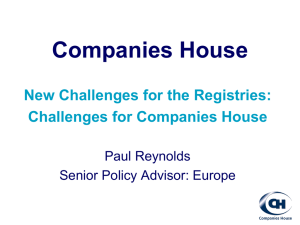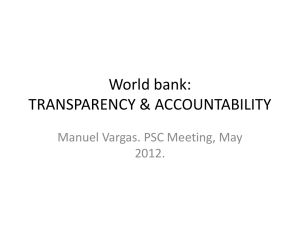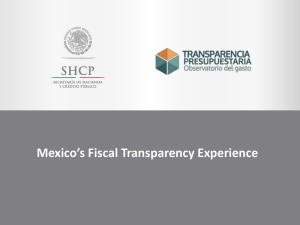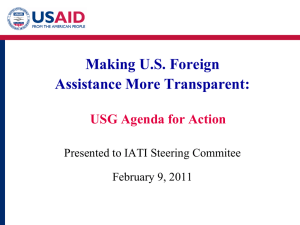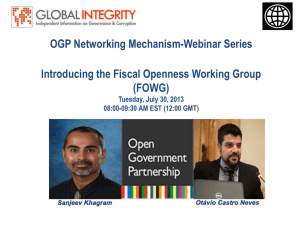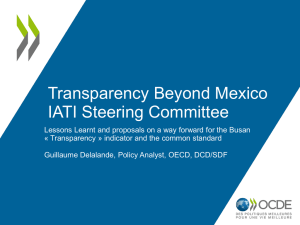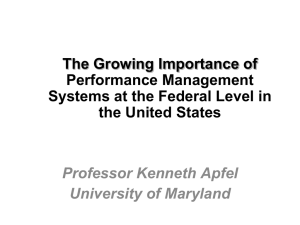FOWG Launch Presentation at OGP Summit 2013
advertisement
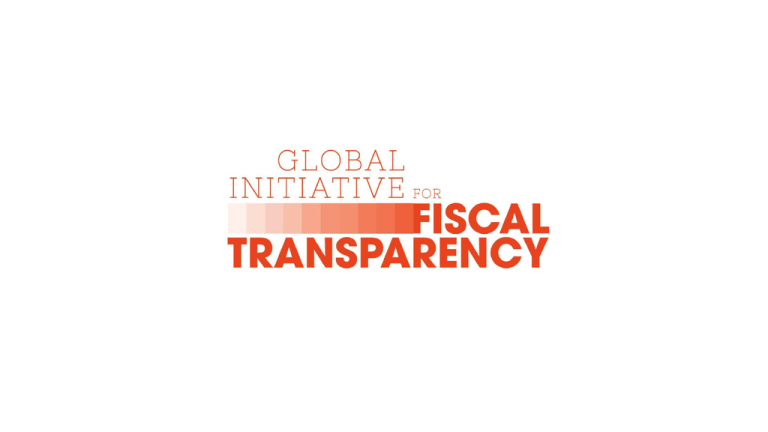
Fiscal Openness in Brazil: The Transparency Portal Jorge Hage Minister of State Office of the Comptroller General of Brazil OGP London Summit 2013 – October 31st Transparency in Brazil 1st Consocial Not-for-Profit Entities Debarment List Fiscal Responsibility Law Eletronic reverse actions Access to Information Law Transparency Portal 2000 Transparency Portals of states and cities 2004 2003 Establishment of CGU National Debarment List World Cup and Olympics Transparency Portals 2008 2010 2006 2005 Regulation of the electronic bidding system 2007 2009 Mandatory Use of Federal Payment Cards Transparency Law (Law nº 131/09) Federal Agreements Portal -SICONV Disclosure of Paychecks 2012 2011 Open Government Partnership – 1st OGP Country Action Plan 2013 Open Government Partnership – 2nd Country Action Plan “Brasil Tranparente” Programm Transparency Portal Expenditures Government Expenditures and Transfers. Daily detailed updates. Access to recipients and beneficiaries Revenues Expected and collected revenues. Daily updates. Organized by origin and type. Transfers Agreements Values, objects and parties involved in the agreements CEIS and CEPIM Debarment List of Companies, individual suppliers and non-for-profit entities Public Officials Status of public officials, distribution of positions and individual salaries Functions of the Transparency Portal •Audit tool •Incentive to social participation •Citizen empowerment instrument •Strengthening Public Management •Corruption Prevention and Fighting No password Free of charge Accessible language Simnplified navigation Open data Reliable and updated information Transparency Portal Punished companies Servidores Public Officials Information Revenues: Daily updates Transfers by program or beneficiary Expenditures: Daily updates Specific Programs Download of Consultations and Charts Federal Direct Expenditures Transparency Network 2014 World Cup and 2016 Olympic Games Transparency Portal in Numbers Amount displayed* Total of visits in 2012 Average Monthly Visits* Increase in visits *Through September 2013 R$ 12,110 trillion 8,170,046 884,027 Some answers you can get on the Portal How much does the government spend in Education? What was the revenue with taxes over imports/exports? What did the Ministry of Health commit to pay today? How many public servants work on that agency? What was the amount transfered to my city last year? How many suplliers have been suspended or debarred? Daily information Types of queries Filters Detailed Information Daily information – Details of each expense Information on Public Officials Information on Public Officials Search by name, agency, position and functions Registry of Expulsion Penalties Information on Public Officials – Search by name Names – Civilian and Military Personnel Public Agency Registry of Expulsion Penalties From 2004 to September 2013 4,555 expulsion penalties were applied to 3,850 federal officials National Debarment List - CEIS Company identification Type and period of sanctions Agency that sanctioned Source of information Companies: 5.220 sanctions applied to 3.725 empresas Individual suppliers: 3.867 sanctions applied to 3.022 people Through September 2013 Not-for-Profit Entities Debarment List Identification of the entity Identification of the Public Body responsible for the sanction 3,971 debarred entities Reason for the sanction Allocation of Government Property Location of asset Agency in charge Vacant or occupied 2014 World Cup Total Expenses Budgeted and Executed Information by city, activity and financial agreement 2016 Rio Olympic Games Information by city themes and type of investment Other Tools E-courses for citizens Email - push system Surveys Frequently Asked Questions section Hotline for reporting misconducts and crimes OGP London Conference 2013 Jorge Hage Minister of State head of the Office of the Comptroller General of Brazil Visit the Transparency Portal www.portaldatransparencia.gov.br cgugabin@cgu.gov.br www.cgu.gov.br Ministry of Planning Federal Budget Secretariat Brazil & Fiscal Transparency Welles Matias de Abreu Assistant Federal Budget Secretary, Substitute Oct, 2013; @ London , UK Ministry of Planning Federal Budget Secretariat Summary Brazilian Legislation Framework What is GIFT? Brazil & GIFT Results Actual Brazilian Actions Ministry of Planning Federal Budget Secretariat Brazilian Legislation Framework 2000: Fiscal Responsibility Law Civil servants spending limits Government debts control (federal, states and municipalities) Public Sector´s Primary Results Stimulus for Fiscal transparency and participation 2011: Access to Public Information Law Promotion the accountability The rule is “transparency” and the exception is “secrecy” Free Information The Global Initiative for Fiscal Transparency (GIFT) is a multistakeholder action network working to Countries: advance and institutionalize global Brazil; Philippines; norms and significant, USA; UK continuous improvements on fiscal transparency, participation, and accountability in countries around the world. NPOs: IBP; iScale GIF T Other: HP; PEFA IOs: WB; FMI; OCDE Ministry of Planning Federal Budget Secretariat Brazil & GIFT Results Brazilian Fiscal Transparency Initiatives: Fiscal Education; Citizen Budget; and Open Data Systems. Main Brazilian Supported Actions @ GIFT: Promotion of Fiscal Transparency Initiatives; GIFT High level Principles; and GIFT UN Resolution. Ministry of Planning Federal Budget Secretariat GIFT UN Resolution (A/RES/67/218) SUMMARY: Recognize GIFT and its High-level Principles on Fiscal Transparency, Participation and Accountability (FTPA); Encourages Member States to intensify efforts to enhance FTPA policies, including the promotion of discussions to advance on commons goals; and Invites Member States and relevant United Nations institutions to promote cooperation and information-sharing among all stakeholders to assist Member States in building capacity and exchanging experiences. Ministry of Planning Federal Budget Secretariat Actual Brazilian Actions Realizing: Improving and creating initiatives to promote fiscal transparency; and Participation in events (8) to promote and share fiscal transparency policies. To Realize: Special Event in UN about Fiscal Transparency Focus on GIFT UN Resolution: Encouraging and Exchanging Fiscal Transparency Initiatives Feb, 2014; @ UN, New York (USA) + Development + Equality +Participation “a country for everyone” “a rich country is a country without misery” “Valuing Democracy” Development with Fiscal Responsibility and Transparency Thank You! Federal Budget Secretariat Phone: +55 61 20202220 E-mail: sof@planejamento.gov.br Toward a People’s Budget Philippine Experience in the Pursuit of Fiscal Openness Undersecretary Richard E. Moya Philippine Department of Budget & Management Philippine Budget Reform Agenda Spending within means Spending on the right priorities Spending on measurable results Through transparent, accountable & participatory public expenditure management Disclosure of Budget Information All Departments must disclose approved budgets & reports, project details & status, contracts awarded, etc. Compliance has improved to 17 of 22 Departments as of Dec ‘12, from 7 in July ’12. Leveraging Technology for Transparency Making the Budget Accessible to Citizens Making the Budget Accessible to Citizens Principles for Constructive Engagement Transparency Accountability Integrity Inclusivity Partnership Consultation and Empowerment Respect for Internal Processes Sustainability National Interest Agency-Civil Society Budget Partnerships 18 agencies and GOCCs entered into BPAs in crafting the 2014 budget, from 6 in the pilot stage (during 2012 Budget preparation). Budget Partnerships during the execution phase introduced. Grassroots Participatory Budgeting P20.1 billion in 2014 Budget for local poverty reduction programs & projects developed with communities & CSOs in 1,226 cities & municipalities (expansion from P8.3 billion for 595 cities & municipalities). Challenge: The Irreversibility of Reform Deeply install reform measures in institutions Reforms must lead to tangible benefits to people Leverage technology and innovation Strong constituency to support & demand for reforms International Alliance for Fiscal Openness Open Budgeting Sanjay Pradhan Vice President for Change, Knowledge and Learning The World Bank Global Challenges Require an ‘Open’ Approach to Development 1.2 billion people live on less than $1.25/ day 2.7 billion people live on between $1.25 and $4.00/ day Openness can be an accelerator Stronger Results Disclosure Citizen Participation MultiStakeholder Collaboration Disclosure: BOOST Analyzing and visualizing public spending data Open Budgets Portal will feature tools for data dissemination and visualization EMIS unit, Kampala, Uganda The Portal will feature data from 12 countries Citizen Participation: Mobile Enhanced Participatory Budgeting Citizens help decide how the local budget is allocated SMS alerts citizens of participatory budgeting sessions Citizens vote via SMS Voted decision is shared via SMS Civil Society Participation In Nepali Budget Monitoring Multi-stakeholder capacity building for collaborative budget monitoring CSOs monitor effective implementation of social security allowance program. Multi-Stakeholder Collaboration: Government Private Sector Civil society Building On and Scaling Up the Open Movement Open Budgeting Ensures That Development Benefits All Fiscal Openness Working Group FOWG October 2013 FOWG Objectives 50 Provide a platform for peer to peer sharing and learning among OGP members on FO, Offer OGP members efficient and coordinated access to international good practices, tools, norms, assessments, and technical expertise on FO, Support OGP members to implement their FO commitments, and develop even more ambitious FO goals and good practices including perhaps common/shared goals, Motivate additional governments to become champions and models of FO. FOWG Overview 51 Over forty countries in the OGP have committed themselves to specific commitments on fiscal openness in a range of areas. Opportunity for OGP Member Countries that have or will make additional or new commitments in the area of fiscal openness (FO). The FOWG will be jointly coordinated by the OGP Support Unit and the multi-stakeholder Global Initiative for Fiscal Transparency (GIFT).

